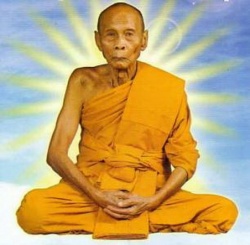Difference between revisions of "The Distinctive Marks of the Bhikkhu"
| Line 1: | Line 1: | ||
[[File:88-126.jpg|thumb|250px|]] | [[File:88-126.jpg|thumb|250px|]] | ||
| − | The {{Wiki|distinctive}} marks of the [[bhikkhu]] in all the [[Buddhist]] countries are the shaven {{Wiki|head}} and the [[saffron]] [[robes]]. The [[reason]] the [[bhikkhu]] adopts this appearance is rooted in the very {{Wiki|nature}} of his calling. | + | The {{Wiki|distinctive}} marks of the [[bhikkhu]] in all the [[Buddhist]] countries are the shaven {{Wiki|head}} and the [[saffron]] [[robes]]. The [[reason]] the [[bhikkhu]] adopts this [[appearance]] is rooted in the very {{Wiki|nature}} of his calling. |
The [[Buddhist monk]] seeks to realize the [[truth]] of [[anatta]], of [[selflessness]]. This means the relinquishing of one’s claims to stand out as a special {{Wiki|individual}}, to be a "somebody". The [[aim]] of the [[bhikkhu]] is to eliminate the [[sense]] of [[ego]] of [[self]] {{Wiki|identification}}. Our [[clothes]], hairstyle, and beard often become {{Wiki|subtle}} ways by which we assert our [[sense]] of {{Wiki|identity}} or express our [[self]] {{Wiki|image}}. [[Bhikkhus]] give up their personal {{Wiki|identity}} and blend into a larger [[body]] the [[Sangha]]. | The [[Buddhist monk]] seeks to realize the [[truth]] of [[anatta]], of [[selflessness]]. This means the relinquishing of one’s claims to stand out as a special {{Wiki|individual}}, to be a "somebody". The [[aim]] of the [[bhikkhu]] is to eliminate the [[sense]] of [[ego]] of [[self]] {{Wiki|identification}}. Our [[clothes]], hairstyle, and beard often become {{Wiki|subtle}} ways by which we assert our [[sense]] of {{Wiki|identity}} or express our [[self]] {{Wiki|image}}. [[Bhikkhus]] give up their personal {{Wiki|identity}} and blend into a larger [[body]] the [[Sangha]]. | ||
| − | The robe and the shaven {{Wiki|head}} is also the theme for their daily {{Wiki|reflection}}. "My [[life]] is different from that of [[worldly]] [[people]]". Unlike the common [[people]], he leads a [[life]] of restraints {{Wiki|self-control}}, and inner cultivation. The robe also serves to make others aware of the [[Buddha’s teaching]]. His conduct has the effect of [[impressing]] on others the [[fruits]] of the [[Buddha’s teaching]]. | + | The robe and the shaven {{Wiki|head}} is also the theme for their daily {{Wiki|reflection}}. "My [[life]] is different from that of [[worldly]] [[people]]". Unlike the common [[people]], he leads a [[life]] of restraints {{Wiki|self-control}}, and inner [[cultivation]]. The robe also serves to make others {{Wiki|aware}} of the [[Buddha’s teaching]]. His conduct has the effect of [[impressing]] on others the [[fruits]] of the [[Buddha’s teaching]]. |
Another special aspect of the lifestyle of the [[Buddhist monk]] is that he [[lives]] in {{Wiki|dependence}} on the [[offerings]] of others. He does not work for his living, he does not receive payment for his [[religious]] services, but he [[lives]] entirely in {{Wiki|dependence}} on the support of the laity. Those who have [[confidence]] in the [[Dhamma]] provide him with the basic requisites, his [[robes]], [[food]], dwelling place, {{Wiki|medicines}}, and whatever other simple {{Wiki|material}} support he might need. | Another special aspect of the lifestyle of the [[Buddhist monk]] is that he [[lives]] in {{Wiki|dependence}} on the [[offerings]] of others. He does not work for his living, he does not receive payment for his [[religious]] services, but he [[lives]] entirely in {{Wiki|dependence}} on the support of the laity. Those who have [[confidence]] in the [[Dhamma]] provide him with the basic requisites, his [[robes]], [[food]], dwelling place, {{Wiki|medicines}}, and whatever other simple {{Wiki|material}} support he might need. | ||
[[Category:Sangha]] | [[Category:Sangha]] | ||
Latest revision as of 20:22, 8 March 2015
The distinctive marks of the bhikkhu in all the Buddhist countries are the shaven head and the saffron robes. The reason the bhikkhu adopts this appearance is rooted in the very nature of his calling. The Buddhist monk seeks to realize the truth of anatta, of selflessness. This means the relinquishing of one’s claims to stand out as a special individual, to be a "somebody". The aim of the bhikkhu is to eliminate the sense of ego of self identification. Our clothes, hairstyle, and beard often become subtle ways by which we assert our sense of identity or express our self image. Bhikkhus give up their personal identity and blend into a larger body the Sangha. The robe and the shaven head is also the theme for their daily reflection. "My life is different from that of worldly people". Unlike the common people, he leads a life of restraints self-control, and inner cultivation. The robe also serves to make others aware of the Buddha’s teaching. His conduct has the effect of impressing on others the fruits of the Buddha’s teaching. Another special aspect of the lifestyle of the Buddhist monk is that he lives in dependence on the offerings of others. He does not work for his living, he does not receive payment for his religious services, but he lives entirely in dependence on the support of the laity. Those who have confidence in the Dhamma provide him with the basic requisites, his robes, food, dwelling place, medicines, and whatever other simple material support he might need.
